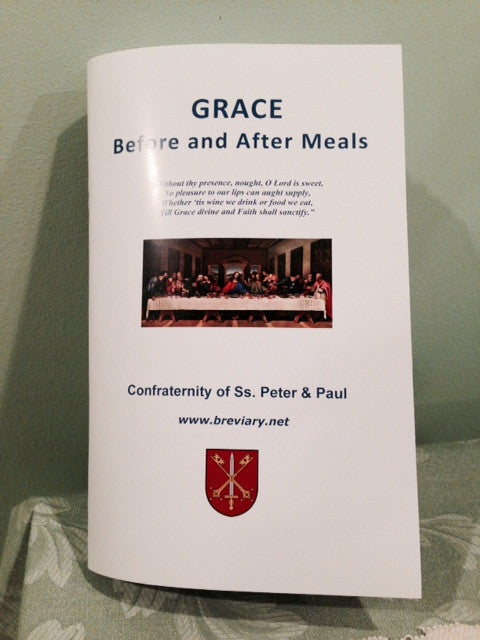Grace Before and After Meals
$18.95
Description
“Without thy presence, naught, O Lord is sweet,
No pleasure to our lips can aught supply,
Whether ’tis wine we drink or food we eat,
Till Grace divine and Faith shall sanctify.”
The second of the liturgical books published by the Confraternity of Ss. Peter & Paul is now in its first edition, and what better way to introduce your family to the liturgy than by adopting the correct traditional prayers to be said before and after we sit down to eat. Mealtimes are the ideal opportunity to pray together as a family, and the form of Grace that we find in the Roman Breviary is surely the best form of Grace that we can use.
Our handy little booklet contains the long form of Grace in both Latin and English, for the midday meal and the evening meal, and for every liturgical season of the year. They are ideal for seminaries, rectories, and other religious houses where the authentic form of Grace is said regularly at mealtime. If you would like to purchase five or more of our booklets please e-mail us (sales@confraternitybooks.com) for details of bulk pricing.
The word grace, as applied to prayer over food, means “thanksgiving” (from the Latin gratiarum actio and the Italian grazie, “thanks”). In English, reciting such a prayer is referred to as “saying grace.” As well as fulfilling our duty of giving thanks to God for the food and drink we are about to receive, the Grace imparts a blessing which sanctifies the meal. Thus, the one saying the blessing should make the Sign of the Cross over the food with his right hand.
That the early Christians prayed before and after meals is indisputable, evidenced by the writings of nearly all the Church Fathers. Tertullian, for example, noted that “we do not recline at a banquet before prayer be first tasted—in like manner prayer puts an end to the feast” (On Prayer 25).
In the religious orders, naturally the custom of grace was much insisted upon. A special section is assigned to it in Chapter 43 of the Rule of St. Benedict. The early monastic rules in fact generally required that each dish brought to table should be separately blessed before it was set before the community.
Great importance was attached to the proper learning of the grace by children. Most educational foundations, like the English public schools and the colleges at the universities, had special forms of grace prescribed for them, some of which are maintained to the present day, even in Latin.
The Grace provided by the Church, and which is contained in this booklet, is contained in the Roman Breviary under the heading Benedictio Mensæ. Grace begins with the acclamation Benedicite, which is spoken by the officiant and repeated by all present. The form for the evening meal, both before and after, varies slightly from that assigned for the midday meal, and during the octaves of certain greater festivals special verses are substituted for those in ordinary use.
The “Grace before and after meals” commonly found in the catechisms for children and used by the laity consists substantially of a translation of two items in the longer Latin grace, the blessing spoken before the meal and the thanksgiving afterwards. These shorter forms of Grace are also contained in our booklet in Latin and English.
Only logged in customers who have purchased this product may leave a review.







Reviews
There are no reviews yet.